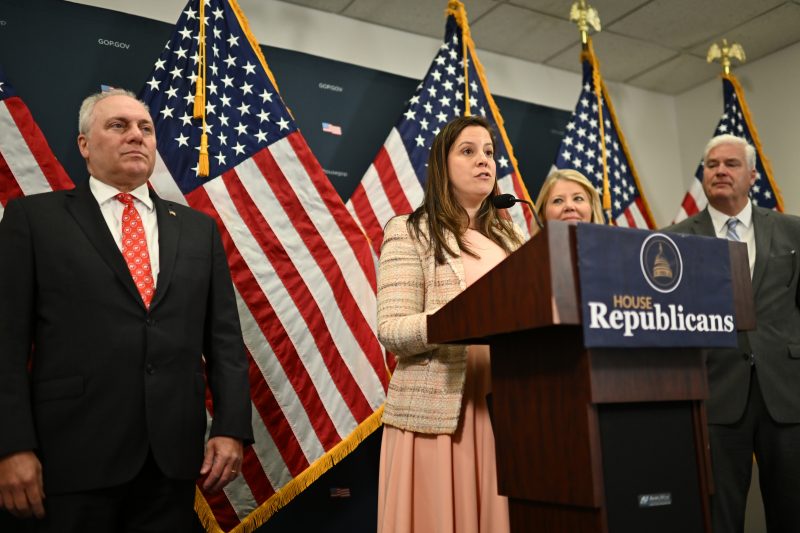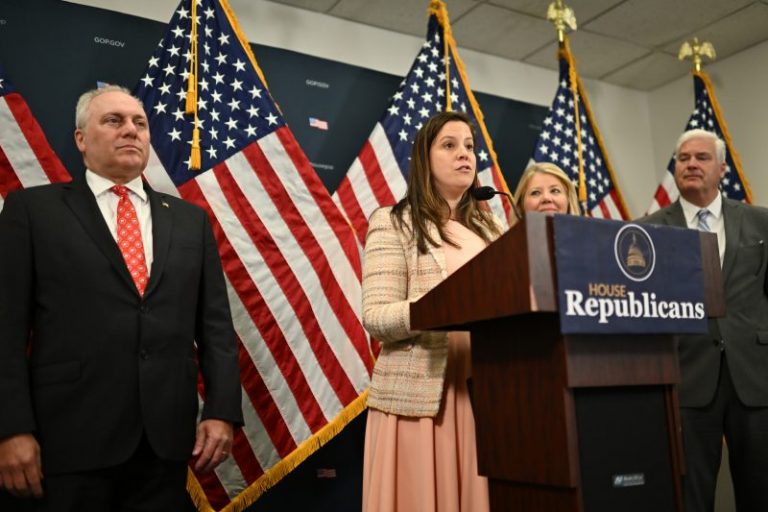
Hard-right Republicans, still angry with House Speaker Kevin McCarthy’s handling of the debt ceiling bill last week, sank a GOP procedural vote Tuesday in a show of strength in a razor-thin majority.
In a surprise rebuke for McCarthy (R-Calif.) and the rest of GOP leadership, the Republican-led House failed to pass the rule for consideration of several bills this week. Eleven Republicans broke with their party to vote with Democrats, and the rule fell short on a 206-220 vote — the first rule vote to fail since November 2002.
House Majority Leader Steve Scalise (R-La.) changed his vote to “no” after he and other GOP leaders failed to convince the far-right House Freedom Caucus to end their blockade before the vote was called, allowing the GOP to revisit the vote once full support from the majority emerges again. It remained unclear what exactly the Freedom Caucus would need to overcome the impasse, plunging this week’s GOP legislation in limbo. On the agenda was a bill to block gas stove regulations and change the process for federal rulemaking.
The rebels who scuttled the procedural vote are among the biggest proponents of the legislation in question — their anger is entirely backward looking, at how last week’s deal was approved with Democratic votes. Now they are taking out their anger on a bill that they otherwise support to demonstrate the power they have in a chamber where McCarthy has only four votes to spare on party-line bills.
The outcome underscored the anger that several members of the House Freedom Caucus still harbored toward Republican leadership over their willingness to allow Democrats to vote in support of the debt bill and override their concerns before sending it to the Senate, where it also passed in bipartisan fashion. President Biden signed the deal over the weekend, barely skirting a catastrophic default that had been projected for Monday.
McCarthy, Biden and their lieutenants had brokered a deal days before to suspend the debt ceiling until 2025 and cut federal spending, prompting outrage from several hard-right GOP lawmakers who argued that the bill did not cut spending enough — and who accused McCarthy of violating several promises that they say helped them elect him speaker.
Given that a significant swath of the far-right bloc of the GOP conference would not support the debt ceiling measure, Republicans needed the help of Democrats to pass a key procedural hurdle, known as the rule, that sets the parameters for debate before final passage. Historically, a rule vote is only passed by the majority party, including those who oppose the final bill. Almost two dozen more Democrats than Republicans also voted to pass the bill to the Senate last Wednesday evening.
In retaliation, the 11 far-right lawmakers voted against the first rule vote this week, preventing GOP leadership’s wish to pass four non-divisive bills that would have returned them to the status quo. It proved the difficulty McCarthy and other leaders now face as they work to make amends with a fractious bloc of the conference that historically bucks leadership.
McCarthy last week had waved off criticisms from members of his party by touting the debt ceiling deal as “the most conservative bill we’ve ever had.”
As the rule vote headed toward failure Tuesday afternoon, several senior Republicans — including Scalise and Majority Whip Tom Emmer (R-Minn.) — huddled with about a dozen Freedom Caucus members in the back of the chamber for a roughly 20-minute negotiation. But rather than changing minds, GOP leadership lost support. Reps. Lauren Boebert (R-Colo.) and Tim Burchett (R-Tenn.) switched their votes to no, bringing the opposition to nearly a dozen.
Two lawmakers familiar with the conversation said that by sinking the rule vote, they had forced a conversation with leaders to ensure they do not get steamrolled again in future spending fights.
“We’re not going to live in the era of the imperial speaker anymore,” Rep. Matt Gaetz (R-Fla.) said after he animatingly debated Scalise on the House floor Tuesday. “We took down the rule because we’re frustrated at the way this place is operating. … We’re concerned that the fundamental commitments that allowed Kevin McCarthy to assume the speakership have been violated as a consequence of the debt limit deal.”
Rep. Ken Buck (R-Colo.), another GOP lawmaker who opposed the rule vote Tuesday, said McCarthy had promised when he became speaker to keep federal spending at 2022 levels.
“He broke that commitment with the Biden-backed debt ceiling ‘deal,’” Buck tweeted Tuesday. “How can he govern if House Republicans can’t trust him to honor his word? How are we supposed to stay unified?”
After they defeated the rule Tuesday, the conservative bloc suggested that McCarthy should find Democrats to pass rules and that they would have more tricks up their sleeves to force leadership to the table. But those moves would surely anger an even broader swath of governing-minded Republicans.
Russ Vought, a Trump administration Office of Management and Budget director who has become an informal adviser for House conservatives, previewed the likelihood that the Freedom Caucus would pump the breaks on leadership for siding with Democrats in an interview with The Washington Post last week.
“You’re going to govern with Hakeem Jeffries? You should get him to [vote on] these procedural rules,” he said, referring to the Democratic House leader. “We’re going to go through a couple of weeks where there’s a reckoning of House conservatives and reflect on what has occurred, and we’ll see the play call they make.”
At the crux of the Freedom Caucus’s complaints are claims that McCarthy did not keep several promises pledged in exchange for some of them to support his speakership bid, specifically that he would prioritize cutting spending significantly and not allow bills supported by Democrats on the floor. None of these promises were written down and released publicly, so it remains unclear what was specifically agreed to in January.
Another point of frustration hinged on Rep. Andrew S. Clyde (R-Ga.) telling his colleagues that Scalise had threatened to block his bill that would repeal an existing rule on pistol braces if he voted against the debt bill. Scalise publicly characterized that conversation differently during a news conference early Tuesday, telling reporters that he had told Clyde his bill is not ready for a floor vote since it does not have enough support from Republicans to pass it.
“It’s something we’re going to be bringing to the floor,” he said. “There are some members that aren’t there yet and we’re working on getting those members there. In fact, Andrew S. Clyde has been helping us with some of the members who aren’t quite there yet because we want this to pass.”
While leadership continues to work with the conservatives to figure out a way to move forward, Rep. Chip Roy (R-Tex.) said it’s going to take “a lot” for leadership to repair what he says are broken promises and trust between leadership and the conservatives members.
One focus is the appropriations process, pointing to comments McCarthy has made both publicly and privately that the debt limit bill was just the first of several ways they could reduce government spending.
While the negotiators agreed to fiscal 2023 spending levels plus a 1 percent increase, the conservatives are continuing to demand fiscal 2022 levels or lower in the appropriations process.
“There are many, many ways in which we all need to … be together for the Republican majority to be able to function effectively,” said Rep. Dan Bishop (R-N.C.).
The conservatives, however, are still not prepared to bring up a motion to vacate — a measure that any one member can bring up to remove McCarthy as speaker — because they don’t have the support of 218 members for it to pass and there is no obvious alternative.
However, staunchly conservative lawmakers did not shy away from putting him on notice. During the weekly GOP conference meeting Tuesday morning, Rep. Bob Good (R-Va.) and Norman, as well as others, stood up to express their disdain for how the debt ceiling process played out, with Good noting it was fair to characterize that the group got “steamrolled” by leadership. McCarthy, according to Good, tried to assuage concerns by stressing that the upcoming government funding process is where Republicans could really make a difference.
Freedom Caucus Chairman Scott Perry (R-Pa.) emerged from the meeting stressing that the group was “assessing the circumstances right now and trying to determine how we can improve our position” in the future. Asked whether the motion to vacate threat had lessened, Perry said, “It’s in the [House] rules for a reason.”
Some Republican lawmakers had privately expressed the opinion that the Freedom Caucus’s threats are worth ignoring, given that many will never vote in support of must-pass legislation that will ultimately be bipartisan in a divided government. Good rejected the premise, arguing that the group overwhelmingly supported an earlier partisan GOP proposal that would have raised the debt ceiling and that it was “reasonable” for them “to suggest that we should have been able to get more of it than we did.”
“What I’m looking for is a demonstration from our conference that we have the will and the resolve to actually cut spending as is needed for the country fiscal,” Good said before walking onto the floor and voting against the rule.


Comments are closed.